动词时态和语态(高一)
图片预览

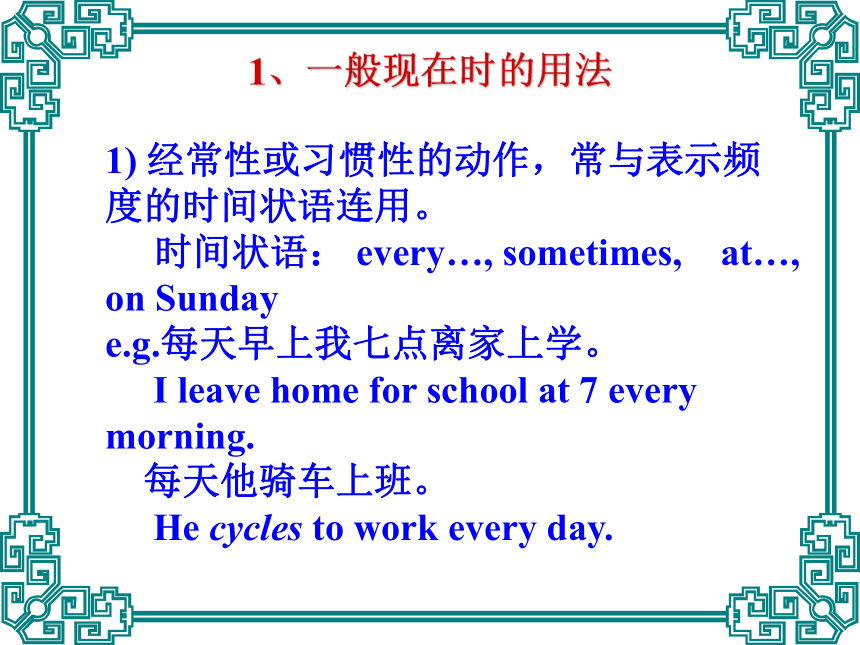
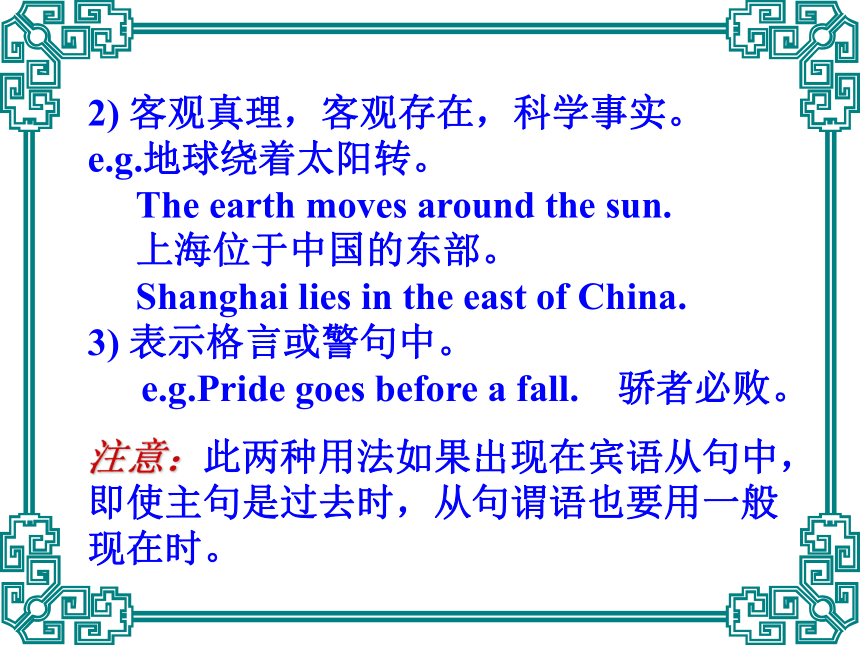

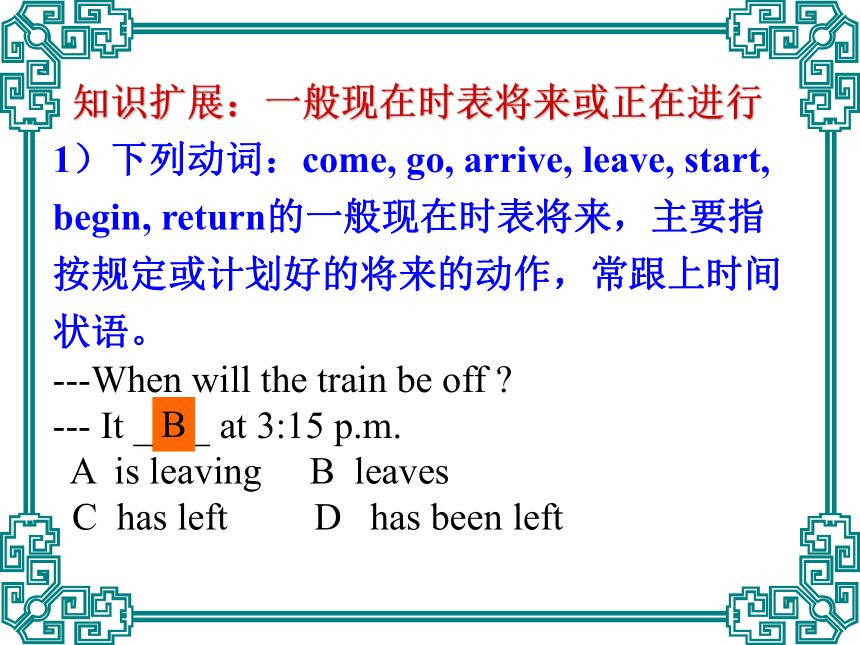
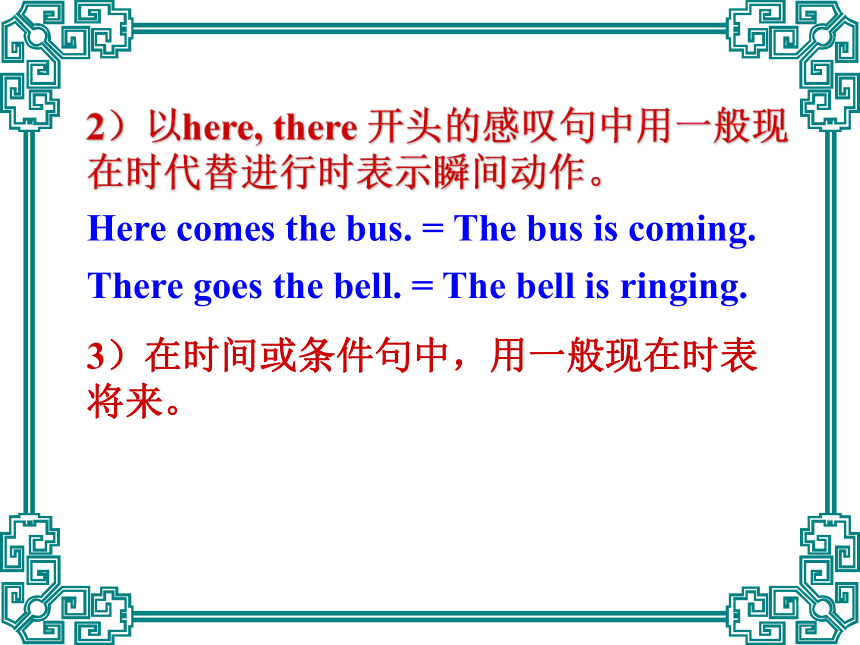
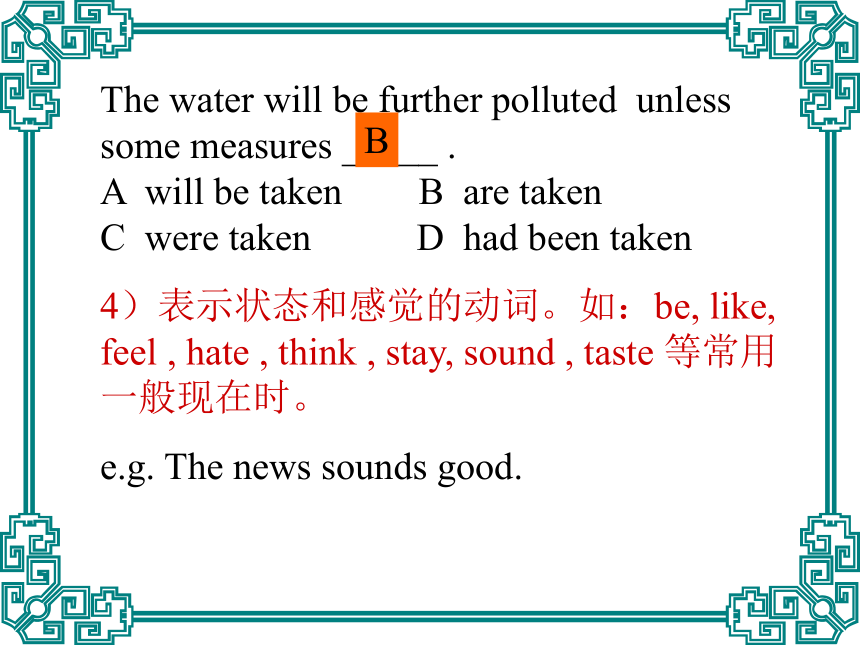
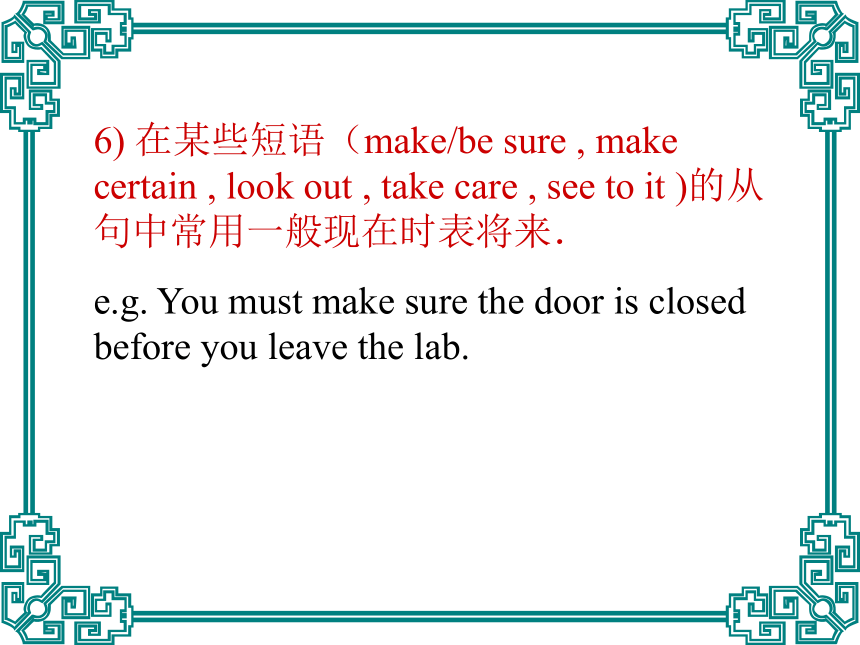
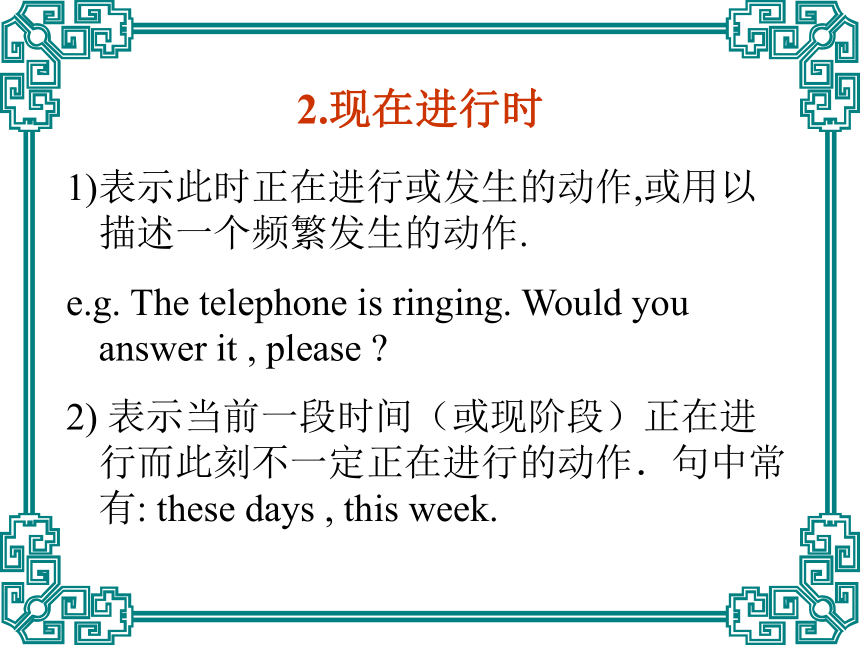
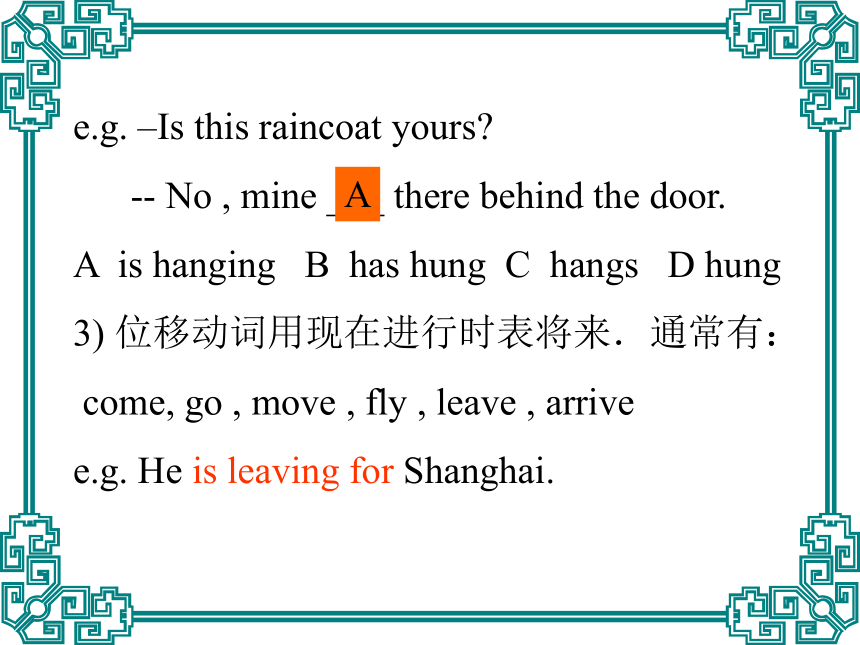
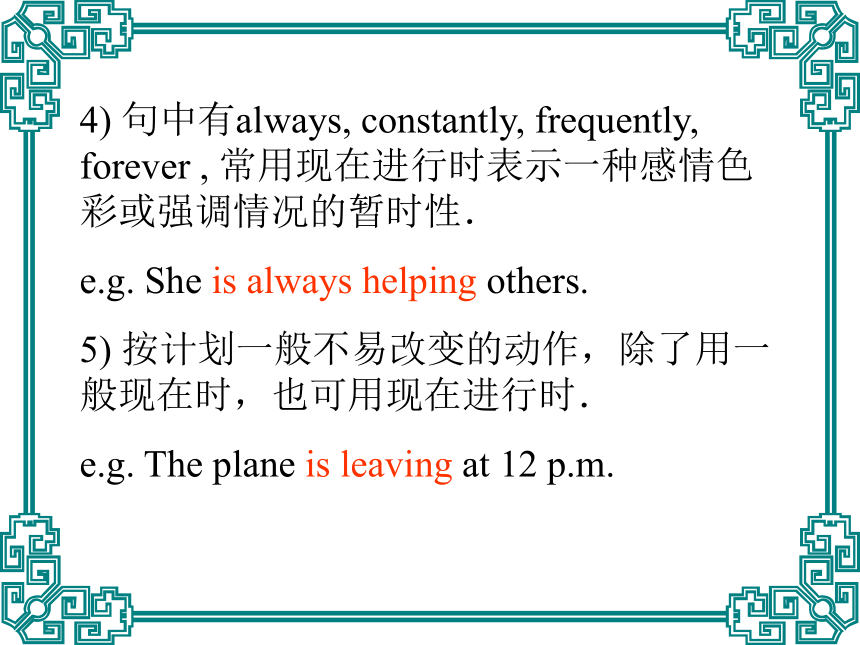

文档简介
(共68张PPT)
高中英语语法(一)
动词的时态和语态
1、一般现在时的用法
1) 经常性或习惯性的动作,常与表示频度的时间状语连用。
时间状语: every…, sometimes, at…, on Sunday
e.g.每天早上我七点离家上学。
I leave home for school at 7 every morning.
每天他骑车上班。
He cycles to work every day.
2) 客观真理,客观存在,科学事实。
e.g.地球绕着太阳转。
The earth moves around the sun.
上海位于中国的东部。
Shanghai lies in the east of China.
3) 表示格言或警句中。
e.g.Pride goes before a fall. 骄者必败。
注意:此两种用法如果出现在宾语从句中,即使主句是过去时,从句谓语也要用一般现在时。
例如:Columbus proved that the earth is round.
4) 现在时刻的状态、能力、性格、个性。
e.g.安英语写得好但说得不好。
Ann writes good English but does not speak well.
知识扩展:一般现在时表将来或正在进行
1)下列动词:come, go, arrive, leave, start, begin, return的一般现在时表将来,主要指按规定或计划好的将来的动作,常跟上时间状语。
---When will the train be off
--- It ____ at 3:15 p.m.
A is leaving B leaves
C has left D has been left
B
2)以here, there 开头的感叹句中用一般现在时代替进行时表示瞬间动作。
Here comes the bus. = The bus is coming.
There goes the bell. = The bell is ringing.
3)在时间或条件句中,用一般现在时表将来。
The water will be further polluted unless some measures _____ .
A will be taken B are taken
C were taken D had been taken
4)表示状态和感觉的动词。如:be, like, feel , hate , think , stay, sound , taste 等常用一般现在时。
e.g. The news sounds good.
B
6) 在某些短语(make/be sure , make certain , look out , take care , see to it )的从句中常用一般现在时表将来.
e.g. You must make sure the door is closed before you leave the lab.
2.现在进行时
表示此时正在进行或发生的动作,或用以描述一个频繁发生的动作.
e.g. The telephone is ringing. Would you answer it , please
2) 表示当前一段时间(或现阶段)正在进行而此刻不一定正在进行的动作.句中常有: these days , this week.
e.g. –Is this raincoat yours
-- No , mine ___ there behind the door.
A is hanging B has hung C hangs D hung
3) 位移动词用现在进行时表将来.通常有:
come, go , move , fly , leave , arrive
e.g. He is leaving for Shanghai.
A
4) 句中有always, constantly, frequently, forever , 常用现在进行时表示一种感彩或强调情况的暂时性.
e.g. She is always helping others.
5) 按计划一般不易改变的动作,除了用一般现在时,也可用现在进行时.
e.g. The plane is leaving at 12 p.m.
6) 带有一种婉转的语气.
e.g. I’m hoping to get a letter from you soon.
I’m looking forward to hearing from you soon.
3. Since I won the big prize, my telephone hasn't stopped ringing.
People _____ to ask how I am going to spend the money.
(05湖南卷)
A. phone B. will phone C. were phoning D. are phoning
4. Selecting a mobile phone for personal use is no easy task because technology _____ so rapidly. (2001 N)
A. is changing B. has changed
C. will have changed D. will change
D
A
知识扩展:不用进行时的动词
1) 事实状态的动词。如:have, belong, possess, cost, owe, exist, include, contain, matter, weigh, measure, continue
I have two brothers.
This house belongs to my sister.
2) 心理状态的动词。
如:know, realize, think see, believe, suppose, imagine, agree, recognize, remember, want, need, forget, prefer, mean, understand, love, hate
I need your help.
He loves her very much
3)系动词。如:seem, remain, lie, see, hear, smell, feel, taste, get, become, turn
You seem a little tired.
3.现在完成时
-- I’m sorry to keep you waiting.
-- Oh, not at all . I __ here only a few minutes.
A have been B had been C was D will be
1) for+ 一段时间,放在句末时, 可以省去for , 但如放在句首或否定句中for 不省略.
A
have / has done
2) 某些固定句型:
a. This / It / That is the first (second…) time +句子(通常用现在完成时)
e.g. This is the second cigarette I have smoked today.
It is the third time that Kate has been ill , isn’t it
b. This is the + 最高级+名词+句子(现在完成时)
e.g. This is the best film I have ever seen .
c. This is (the only) one of +名词+句子(现在完成时)
e.g. He is one of the brightest students who have graduated from our school.
典型例题 (1) --- Do you know our town at all --- No, this is the first time I ___ here. A. was B. have been C. came D. am coming
(2) --- Have you ____ been to our town before --- No, it’s the first time I ___ here. A. even, come B. even, have come
C. ever, come D. ever, have come
B
D
(对)I haven't received his letter for almost a month.
(错)I have received his letter for a month.
注意:非延续性动词的否定形式可以与表示延续时间的状语连用。
3. _____ my sister three times today but her line was always
busy. (05北京春季)
A. I’d phoned B. I’ve been phoning
C. I’ve phoned D. I was phoning
4. --- You haven’t been to Beijing, have you
--- _____. How I wish to go there! (98 N)
A. Yes, I have B. Yes, I haven’t
C. No, I have D. No, I haven’t
说明:此题的干扰源是后面的 was busy。今天打了三次电话是用来表示结果的,只能用现在完成时;而每次她都占线是表示过去的动作,所以用一般过去时。
C
D
3) have been to 去过, 现在不在那儿
have gone to 已去了,现在可能在那儿,可能在路上.
should have done 本该做某事
shouldn’t have done 本不该做某事
would have done 本想做某事
need have done 本有必要做某事
must have done 一定做过某事
4.现在完成进行时
have / has been doing
不可以用于进行时态的动词,如;be , like, know , see, hear , belong , hate等, 也不能用于现在完成进行时.
2)用“how long …”结构征询目前正在进行的动作时,习惯上用现在完成进行时.
过去发生的动作持续到现在并可能继续发生。
e.g. How long have you been learning French
--- Hi, Tracy, you look tired.
--- I am tired. I _____ the living room all day. (98 N)
A. painted B. had painted
C. have been painting D. have painted
C
说明:这句话的意思是“我一整天都在刷起居室”,现在完成进行时表示从过去开始的一个动作一直持续到现在,而且还在进行当中。强调的是“一直在做”。
8. Now that she is out of a job, Lucy______ going back to school, but she hasn’t decided yet. (04北京)
A had considered B has been considering
C considered D is going to consider
B
说明:她“一直在考虑返校”是现在完成进行时,“还没作决定”是现在的结果。
5.一般过去时
1).表示一个发生在过去某一特定时间的动作或状态,一种过去的习惯和一个在过去某一时间中已结束的动作.
1. --- Nancy is not coming tonight.
--- But she _____! (98 N)
A. promises B. promised C. will promise
高考题点击:
D. had promised
B
2. My uncle _____ until he was forty-five. (2000 上海)
A. married B. didn’t marry
C. was not marrying D. would marry
B
3. --- You haven’t said a word about my new coat, Brenda. Do you like it (N2002)
--- I’m sorry I _______ anything about it sooner. I certainly think it’s pretty on you.
A. wasn’t saying B. don’t say C. won’t say D. didn’t say
D
2)表示过去经常发生的动作或习惯性动作, 也可用used to do 或would do
e.g. I would swim in the river during the vocation .
Mother used to tell us stories when we were young.
3)表示“原来…”时,经常用一般过去时,近几年的考题多涉及这一用法。
e.g. I didn’t know you were here.
-- Oh, it’s you ! I didn’t recognize you.
The pen I ___ I ____ is on my desk.
A think , lost B thought , had lost
C think , had lost D thought, have lost
B
4) 当我们按照时间顺序来谈论过去连续发生的两个或两个以上的动作时,常用一般过去时.
e.g. On Saturday afternoon , Mrs. Green went to the market , bought some bananas and visited her cousin.
5) 一般过去时在一些虚拟语气中表示与现在或将来的动作相反.
}
I would rather
as if
I wish
+ that (用一般过去时)
e.g. It’s time
e.g. It’s time we started our work.
I wish I were an engineer.
I would rather you didn’t do that now.
6.过去进行时
1)过去某个时间正在进行或正在发生的动作,也可能表示过去一段时间内发生的动作.
e.g. –Hey, look where you are going.
--Oh, I’m terribly sorry. ______.
A I’m not noticing B I wasn’t noticing
C I haven’t noticed D I don’t notice
B
--Excuse me , sir. Would you do me a favor
--Of course. What is it
--I ______ if you could tell me how to fill out this form.
A had wondered B was wondering
C would wonder D did wonder
B
2) 过去进行时的另一种主要用法是描述某一件事发生的背景.(句子中的两个动作,背景动作时间长,但另一个短动作更重要,因此,短动作用一般过去时,背景动作用过去进行时.
e.g. It ____________(snow) as they ________ (make) their way to the front.
Tom________ (slip) into the house when no one_____________ (look)
was snowing
made
slipped
was looking.
3) 和现在进行时一样,与always , constantly, frequently, forever 等连用,表示一种感彩.
e.g. He was making trouble all the time.
7.过去完成时
到过去某个时间为止已发生的动作,用过去完成时. had done
e.g. Helen ______ her keys in the office , so she had to wait until her husband ____ home.
A has left , comes B left, had come
C had left , came D had left , would come
C
2) 用于it was +时间+since引导的从句中
e.g. I said it was at least ten years since I
_____________ ( enjoy ) a good time.
3) scarcely /hardly +had done+ when
no sooner +had done + than
刚…就…
had enjoyed
e.g. We had scarcely got in the grain when it began to rain.
He ______ to the lab than he set out to do the experiment.
A has no sooner got B no sooner got
C will no sooner get D had no sooner got
D
4) 有些动词如: hope , plan , think , want , mean , suppose , intend 等动词的过去完成时, 可用来表示过去未曾实现的想法、希望、打算或意图.
e.g. I had hoped you would turn a university student.
5) 用在if only , would rather, wish 是虚拟语气及虚拟条件句中,表示与过去的事实相反.
e.g. If only I had taken his advice.
I would rather you had told me the truth.
I wish I had seen you yesterday.
6)用于某些固定句型中
It was the first time +从句
e.g. It was the first time that he had sung in English.
second…
------
6. The little girl ____ her heart out because she ____ her toy
bear and believed she wasn’t ever going to find it. (02 北京)
A. had cried, lost B. cried, had lost
C. has cried, has lost D. cries, has lost
7. — Hurry up! Alice and Sue are waiting for you at the
school gate.
— Oh! I thought they ______ without me. (05江西卷)
A.went B.are going C.have gone D.had gone
B
D
8 过去完成进行时
指到过去某个时间为止一直在进行的动作,并有继续发生的可能性.
had been doing
e.g. It had been raining for a week by then.
9 一般将来时
表现的形式很多,如下:
be going to 常用来表示已决定或安排要做的事或打算,也可用于必然或很可能发生的事,或者已有客观迹象表明将要发生的情况.
e.g. Look at those clouds! It _______________ (rain)
is going to rain
2) shall / will 表示临时决定做某事,还可以表示意愿.
e.g. I’ll tell you about it if you will listen to me.
-- You’ve left the light on.
-- Oh, so I have. ____ and turn it off.
A I’ll go B I’ve gone C I go D I’m going
A
3) 由表示位移的动词的进行时表将来.
e.g. When are the men coming from England
be to do 表示约定的或按职责、义务、要求即将发生的动作,还可表示注定要发生的动作、意图、可能性.
e.g. I feel it is your husband who __________
(blame) for the spoilt child.
is to blame
5) be about to 表示即将发生的动作,但不与时间状语连用.
e.g. She is about to set off.
6) be due to 表示将来的用法与时刻表或计划有关.
e.g. The train to Beijing is due to arrive at 12:15.
高考题点击:
1. If a man _____ succeed, he must work as hard as he can.
(95 上海)
A. will B. is to C. is going to D. should
2. --- Sorry I forgot to post the letter for you.
--- Never mind, ______ it myself tonight.
A. I’m going to post B. I’d better to post
C. I’ll post D I’d rather
B
A
10.过去将来时
多由 would do 构成
从过去的观点看将要发生的事情.
e.g. He told us that the journey would be exciting.
2) 表示过去的习惯性动作
e.g. He would bring something nice to me when he was young.
3) 表示客气的请求.
e.g. Would you mind if I smoke
11将来完成时
shall/ will have done
常与by和 before引导的将来时间连用.
e.g. By the end of next month, we surely ____ a satisfactory solution to the problem.
A have found B will be finding
C will have found D are finding
C
12.将来进行时
will / shall be doing
表示将来某个时刻正在进行或发生的动作,常有时间状语.
e.g. At this time tomorrow ______ over the Atlantic.
A. we’re going to fly B. we’ll be flying
C. we’ll fly D. we’re to fly
B
高考题点击:
1. --- Can I join the club, Dad
--- You can when you _____ a bit older. (94 N)
A. get B. will get C. are getting D. will have got
2. In such dry weather, the flowers will have to be watered if
they _____. (2001上海)
A. have survived B. are to survive
C. would survive D. will survive
A
B
3. By the time Jane gets home, her aunt _______for London to
attend a meeting. (05天津卷)
A. will leave B. leaves C. will have left D. left
4. We were all surprised when he made it clear that he _____
office soon. (93 N)
A. leaves B. would leave C. left D. had left
C
B
5. He will have learned English for eight years by the time he
_____ from the university next year. (2002上海)
A. will graduate B. will have graduated
C. graduates D. is to graduate
说明:by the time 引导的是时间状语从句,故不能使用将来时。D选项虽可考虑,但 be to 结构大多用来表示“义务、决定、职责、约定”等,与句意不合。
C
注意:1.宾语从句中,主句是现在的时态,从句的时态不受限制;主句是过去的时态,从句要用过去的某一时态.
2.从句是客观真理时,从句不受主句时态的影响.
3.定语从句,比较状语从句不受主句时态的影响.
祈使句中的动词问题
高考题点击:
1. _____ it with me and I’ll see what I can do. (98 N)
A. When left B. Leaving C. If you leave D. Leave
2. _____ some of this juice --- perhaps you’ll like it.
(2000 北京春季)
A. Trying B. Try C. To try D. Have tried
3. _____ at the door before entering, please. (01 北京春季)
A. knocked B. To knock C. Knocking D. Knock
4. _____ blood if you can and many lives will be saved.
(2001上海)
A. Giving B. Give C. Given D. To give
D
B
D
B
被 动 语 态
1.被动语态由助动词be + done
在be动词,情态动词和助动词后面加be动词的各种形式,如:being, been , be等.
e.g. He is reading a book.
A book is being read by him.
They would buy the house.
The house would be bought by them.
I have seen the film.
The film have been seen.
2. 不及物动词没有被动语态.如: belong, happen , take place , end , come up, spread , last , come true , break out , come into being , come out , come up , consist of , give out , work out , go up , live on , fail , remain , succeed , lack , escape , exist .
3.有些及物动词没有被动语态.
cost, hold, fit, equal , become , have , own, date from , agree with , come across
4. make sb do 变为被动语态时,要还原to.
e.g. He was made to go .
5.被动语态的特例:
get done
get hurt , get paid , get lost , get wounded
e.g. Cleaning women in big cities usually get ______ by the hour.
A. pay B. paid C. paying D. to pay
6.主动形式表被动的情况:
1)系动词没有被动语态.
e.g. It sounds interesting.
2) 有些表行为、方式的动词如:open, sell, write , close , shut, lock , cook , wash , draw , read , keep , wear , clean 等用主动表被动.
e.g. The cloth washes well.
The pen writes well.
Books of this kind sell well.
3) 有些及物动词如:print , burn , build, prepare等常用进行时表被动.
e.g. The factory is building.
The book is printing.
4) be + adv.或介词词组,用主动表被动.
如:be on, be on show , be on sale, be in sight, be under discussion /control / repair
e.g. The question is under discussion.
be + adj.+ to do (主动)
e.g. The problem is difficult to work out.
6) be to blame / let (主动)
e.g. The house is to let.
Goodbye
高中英语语法(一)
动词的时态和语态
1、一般现在时的用法
1) 经常性或习惯性的动作,常与表示频度的时间状语连用。
时间状语: every…, sometimes, at…, on Sunday
e.g.每天早上我七点离家上学。
I leave home for school at 7 every morning.
每天他骑车上班。
He cycles to work every day.
2) 客观真理,客观存在,科学事实。
e.g.地球绕着太阳转。
The earth moves around the sun.
上海位于中国的东部。
Shanghai lies in the east of China.
3) 表示格言或警句中。
e.g.Pride goes before a fall. 骄者必败。
注意:此两种用法如果出现在宾语从句中,即使主句是过去时,从句谓语也要用一般现在时。
例如:Columbus proved that the earth is round.
4) 现在时刻的状态、能力、性格、个性。
e.g.安英语写得好但说得不好。
Ann writes good English but does not speak well.
知识扩展:一般现在时表将来或正在进行
1)下列动词:come, go, arrive, leave, start, begin, return的一般现在时表将来,主要指按规定或计划好的将来的动作,常跟上时间状语。
---When will the train be off
--- It ____ at 3:15 p.m.
A is leaving B leaves
C has left D has been left
B
2)以here, there 开头的感叹句中用一般现在时代替进行时表示瞬间动作。
Here comes the bus. = The bus is coming.
There goes the bell. = The bell is ringing.
3)在时间或条件句中,用一般现在时表将来。
The water will be further polluted unless some measures _____ .
A will be taken B are taken
C were taken D had been taken
4)表示状态和感觉的动词。如:be, like, feel , hate , think , stay, sound , taste 等常用一般现在时。
e.g. The news sounds good.
B
6) 在某些短语(make/be sure , make certain , look out , take care , see to it )的从句中常用一般现在时表将来.
e.g. You must make sure the door is closed before you leave the lab.
2.现在进行时
表示此时正在进行或发生的动作,或用以描述一个频繁发生的动作.
e.g. The telephone is ringing. Would you answer it , please
2) 表示当前一段时间(或现阶段)正在进行而此刻不一定正在进行的动作.句中常有: these days , this week.
e.g. –Is this raincoat yours
-- No , mine ___ there behind the door.
A is hanging B has hung C hangs D hung
3) 位移动词用现在进行时表将来.通常有:
come, go , move , fly , leave , arrive
e.g. He is leaving for Shanghai.
A
4) 句中有always, constantly, frequently, forever , 常用现在进行时表示一种感彩或强调情况的暂时性.
e.g. She is always helping others.
5) 按计划一般不易改变的动作,除了用一般现在时,也可用现在进行时.
e.g. The plane is leaving at 12 p.m.
6) 带有一种婉转的语气.
e.g. I’m hoping to get a letter from you soon.
I’m looking forward to hearing from you soon.
3. Since I won the big prize, my telephone hasn't stopped ringing.
People _____ to ask how I am going to spend the money.
(05湖南卷)
A. phone B. will phone C. were phoning D. are phoning
4. Selecting a mobile phone for personal use is no easy task because technology _____ so rapidly. (2001 N)
A. is changing B. has changed
C. will have changed D. will change
D
A
知识扩展:不用进行时的动词
1) 事实状态的动词。如:have, belong, possess, cost, owe, exist, include, contain, matter, weigh, measure, continue
I have two brothers.
This house belongs to my sister.
2) 心理状态的动词。
如:know, realize, think see, believe, suppose, imagine, agree, recognize, remember, want, need, forget, prefer, mean, understand, love, hate
I need your help.
He loves her very much
3)系动词。如:seem, remain, lie, see, hear, smell, feel, taste, get, become, turn
You seem a little tired.
3.现在完成时
-- I’m sorry to keep you waiting.
-- Oh, not at all . I __ here only a few minutes.
A have been B had been C was D will be
1) for+ 一段时间,放在句末时, 可以省去for , 但如放在句首或否定句中for 不省略.
A
have / has done
2) 某些固定句型:
a. This / It / That is the first (second…) time +句子(通常用现在完成时)
e.g. This is the second cigarette I have smoked today.
It is the third time that Kate has been ill , isn’t it
b. This is the + 最高级+名词+句子(现在完成时)
e.g. This is the best film I have ever seen .
c. This is (the only) one of +名词+句子(现在完成时)
e.g. He is one of the brightest students who have graduated from our school.
典型例题 (1) --- Do you know our town at all --- No, this is the first time I ___ here. A. was B. have been C. came D. am coming
(2) --- Have you ____ been to our town before --- No, it’s the first time I ___ here. A. even, come B. even, have come
C. ever, come D. ever, have come
B
D
(对)I haven't received his letter for almost a month.
(错)I have received his letter for a month.
注意:非延续性动词的否定形式可以与表示延续时间的状语连用。
3. _____ my sister three times today but her line was always
busy. (05北京春季)
A. I’d phoned B. I’ve been phoning
C. I’ve phoned D. I was phoning
4. --- You haven’t been to Beijing, have you
--- _____. How I wish to go there! (98 N)
A. Yes, I have B. Yes, I haven’t
C. No, I have D. No, I haven’t
说明:此题的干扰源是后面的 was busy。今天打了三次电话是用来表示结果的,只能用现在完成时;而每次她都占线是表示过去的动作,所以用一般过去时。
C
D
3) have been to 去过, 现在不在那儿
have gone to 已去了,现在可能在那儿,可能在路上.
should have done 本该做某事
shouldn’t have done 本不该做某事
would have done 本想做某事
need have done 本有必要做某事
must have done 一定做过某事
4.现在完成进行时
have / has been doing
不可以用于进行时态的动词,如;be , like, know , see, hear , belong , hate等, 也不能用于现在完成进行时.
2)用“how long …”结构征询目前正在进行的动作时,习惯上用现在完成进行时.
过去发生的动作持续到现在并可能继续发生。
e.g. How long have you been learning French
--- Hi, Tracy, you look tired.
--- I am tired. I _____ the living room all day. (98 N)
A. painted B. had painted
C. have been painting D. have painted
C
说明:这句话的意思是“我一整天都在刷起居室”,现在完成进行时表示从过去开始的一个动作一直持续到现在,而且还在进行当中。强调的是“一直在做”。
8. Now that she is out of a job, Lucy______ going back to school, but she hasn’t decided yet. (04北京)
A had considered B has been considering
C considered D is going to consider
B
说明:她“一直在考虑返校”是现在完成进行时,“还没作决定”是现在的结果。
5.一般过去时
1).表示一个发生在过去某一特定时间的动作或状态,一种过去的习惯和一个在过去某一时间中已结束的动作.
1. --- Nancy is not coming tonight.
--- But she _____! (98 N)
A. promises B. promised C. will promise
高考题点击:
D. had promised
B
2. My uncle _____ until he was forty-five. (2000 上海)
A. married B. didn’t marry
C. was not marrying D. would marry
B
3. --- You haven’t said a word about my new coat, Brenda. Do you like it (N2002)
--- I’m sorry I _______ anything about it sooner. I certainly think it’s pretty on you.
A. wasn’t saying B. don’t say C. won’t say D. didn’t say
D
2)表示过去经常发生的动作或习惯性动作, 也可用used to do 或would do
e.g. I would swim in the river during the vocation .
Mother used to tell us stories when we were young.
3)表示“原来…”时,经常用一般过去时,近几年的考题多涉及这一用法。
e.g. I didn’t know you were here.
-- Oh, it’s you ! I didn’t recognize you.
The pen I ___ I ____ is on my desk.
A think , lost B thought , had lost
C think , had lost D thought, have lost
B
4) 当我们按照时间顺序来谈论过去连续发生的两个或两个以上的动作时,常用一般过去时.
e.g. On Saturday afternoon , Mrs. Green went to the market , bought some bananas and visited her cousin.
5) 一般过去时在一些虚拟语气中表示与现在或将来的动作相反.
}
I would rather
as if
I wish
+ that (用一般过去时)
e.g. It’s time
e.g. It’s time we started our work.
I wish I were an engineer.
I would rather you didn’t do that now.
6.过去进行时
1)过去某个时间正在进行或正在发生的动作,也可能表示过去一段时间内发生的动作.
e.g. –Hey, look where you are going.
--Oh, I’m terribly sorry. ______.
A I’m not noticing B I wasn’t noticing
C I haven’t noticed D I don’t notice
B
--Excuse me , sir. Would you do me a favor
--Of course. What is it
--I ______ if you could tell me how to fill out this form.
A had wondered B was wondering
C would wonder D did wonder
B
2) 过去进行时的另一种主要用法是描述某一件事发生的背景.(句子中的两个动作,背景动作时间长,但另一个短动作更重要,因此,短动作用一般过去时,背景动作用过去进行时.
e.g. It ____________(snow) as they ________ (make) their way to the front.
Tom________ (slip) into the house when no one_____________ (look)
was snowing
made
slipped
was looking.
3) 和现在进行时一样,与always , constantly, frequently, forever 等连用,表示一种感彩.
e.g. He was making trouble all the time.
7.过去完成时
到过去某个时间为止已发生的动作,用过去完成时. had done
e.g. Helen ______ her keys in the office , so she had to wait until her husband ____ home.
A has left , comes B left, had come
C had left , came D had left , would come
C
2) 用于it was +时间+since引导的从句中
e.g. I said it was at least ten years since I
_____________ ( enjoy ) a good time.
3) scarcely /hardly +had done+ when
no sooner +had done + than
刚…就…
had enjoyed
e.g. We had scarcely got in the grain when it began to rain.
He ______ to the lab than he set out to do the experiment.
A has no sooner got B no sooner got
C will no sooner get D had no sooner got
D
4) 有些动词如: hope , plan , think , want , mean , suppose , intend 等动词的过去完成时, 可用来表示过去未曾实现的想法、希望、打算或意图.
e.g. I had hoped you would turn a university student.
5) 用在if only , would rather, wish 是虚拟语气及虚拟条件句中,表示与过去的事实相反.
e.g. If only I had taken his advice.
I would rather you had told me the truth.
I wish I had seen you yesterday.
6)用于某些固定句型中
It was the first time +从句
e.g. It was the first time that he had sung in English.
second…
------
6. The little girl ____ her heart out because she ____ her toy
bear and believed she wasn’t ever going to find it. (02 北京)
A. had cried, lost B. cried, had lost
C. has cried, has lost D. cries, has lost
7. — Hurry up! Alice and Sue are waiting for you at the
school gate.
— Oh! I thought they ______ without me. (05江西卷)
A.went B.are going C.have gone D.had gone
B
D
8 过去完成进行时
指到过去某个时间为止一直在进行的动作,并有继续发生的可能性.
had been doing
e.g. It had been raining for a week by then.
9 一般将来时
表现的形式很多,如下:
be going to 常用来表示已决定或安排要做的事或打算,也可用于必然或很可能发生的事,或者已有客观迹象表明将要发生的情况.
e.g. Look at those clouds! It _______________ (rain)
is going to rain
2) shall / will 表示临时决定做某事,还可以表示意愿.
e.g. I’ll tell you about it if you will listen to me.
-- You’ve left the light on.
-- Oh, so I have. ____ and turn it off.
A I’ll go B I’ve gone C I go D I’m going
A
3) 由表示位移的动词的进行时表将来.
e.g. When are the men coming from England
be to do 表示约定的或按职责、义务、要求即将发生的动作,还可表示注定要发生的动作、意图、可能性.
e.g. I feel it is your husband who __________
(blame) for the spoilt child.
is to blame
5) be about to 表示即将发生的动作,但不与时间状语连用.
e.g. She is about to set off.
6) be due to 表示将来的用法与时刻表或计划有关.
e.g. The train to Beijing is due to arrive at 12:15.
高考题点击:
1. If a man _____ succeed, he must work as hard as he can.
(95 上海)
A. will B. is to C. is going to D. should
2. --- Sorry I forgot to post the letter for you.
--- Never mind, ______ it myself tonight.
A. I’m going to post B. I’d better to post
C. I’ll post D I’d rather
B
A
10.过去将来时
多由 would do 构成
从过去的观点看将要发生的事情.
e.g. He told us that the journey would be exciting.
2) 表示过去的习惯性动作
e.g. He would bring something nice to me when he was young.
3) 表示客气的请求.
e.g. Would you mind if I smoke
11将来完成时
shall/ will have done
常与by和 before引导的将来时间连用.
e.g. By the end of next month, we surely ____ a satisfactory solution to the problem.
A have found B will be finding
C will have found D are finding
C
12.将来进行时
will / shall be doing
表示将来某个时刻正在进行或发生的动作,常有时间状语.
e.g. At this time tomorrow ______ over the Atlantic.
A. we’re going to fly B. we’ll be flying
C. we’ll fly D. we’re to fly
B
高考题点击:
1. --- Can I join the club, Dad
--- You can when you _____ a bit older. (94 N)
A. get B. will get C. are getting D. will have got
2. In such dry weather, the flowers will have to be watered if
they _____. (2001上海)
A. have survived B. are to survive
C. would survive D. will survive
A
B
3. By the time Jane gets home, her aunt _______for London to
attend a meeting. (05天津卷)
A. will leave B. leaves C. will have left D. left
4. We were all surprised when he made it clear that he _____
office soon. (93 N)
A. leaves B. would leave C. left D. had left
C
B
5. He will have learned English for eight years by the time he
_____ from the university next year. (2002上海)
A. will graduate B. will have graduated
C. graduates D. is to graduate
说明:by the time 引导的是时间状语从句,故不能使用将来时。D选项虽可考虑,但 be to 结构大多用来表示“义务、决定、职责、约定”等,与句意不合。
C
注意:1.宾语从句中,主句是现在的时态,从句的时态不受限制;主句是过去的时态,从句要用过去的某一时态.
2.从句是客观真理时,从句不受主句时态的影响.
3.定语从句,比较状语从句不受主句时态的影响.
祈使句中的动词问题
高考题点击:
1. _____ it with me and I’ll see what I can do. (98 N)
A. When left B. Leaving C. If you leave D. Leave
2. _____ some of this juice --- perhaps you’ll like it.
(2000 北京春季)
A. Trying B. Try C. To try D. Have tried
3. _____ at the door before entering, please. (01 北京春季)
A. knocked B. To knock C. Knocking D. Knock
4. _____ blood if you can and many lives will be saved.
(2001上海)
A. Giving B. Give C. Given D. To give
D
B
D
B
被 动 语 态
1.被动语态由助动词be + done
在be动词,情态动词和助动词后面加be动词的各种形式,如:being, been , be等.
e.g. He is reading a book.
A book is being read by him.
They would buy the house.
The house would be bought by them.
I have seen the film.
The film have been seen.
2. 不及物动词没有被动语态.如: belong, happen , take place , end , come up, spread , last , come true , break out , come into being , come out , come up , consist of , give out , work out , go up , live on , fail , remain , succeed , lack , escape , exist .
3.有些及物动词没有被动语态.
cost, hold, fit, equal , become , have , own, date from , agree with , come across
4. make sb do 变为被动语态时,要还原to.
e.g. He was made to go .
5.被动语态的特例:
get done
get hurt , get paid , get lost , get wounded
e.g. Cleaning women in big cities usually get ______ by the hour.
A. pay B. paid C. paying D. to pay
6.主动形式表被动的情况:
1)系动词没有被动语态.
e.g. It sounds interesting.
2) 有些表行为、方式的动词如:open, sell, write , close , shut, lock , cook , wash , draw , read , keep , wear , clean 等用主动表被动.
e.g. The cloth washes well.
The pen writes well.
Books of this kind sell well.
3) 有些及物动词如:print , burn , build, prepare等常用进行时表被动.
e.g. The factory is building.
The book is printing.
4) be + adv.或介词词组,用主动表被动.
如:be on, be on show , be on sale, be in sight, be under discussion /control / repair
e.g. The question is under discussion.
be + adj.+ to do (主动)
e.g. The problem is difficult to work out.
6) be to blame / let (主动)
e.g. The house is to let.
Goodbye
